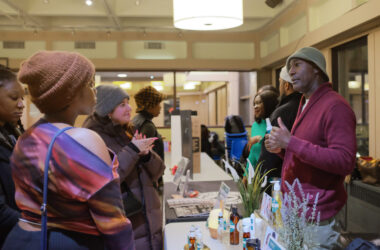Think you’re on Facebook to socialize? Think again. With over 20,000 new members registering daily for the infamous friendship network, Facebook is known, first and foremost, as an efficient tool for the communicating masses. While eager stalkers interact via notes, poking and wall writing, they are also tuning into something much larger and essentially much vainer: themselves.
Undeniably, we value Facebook as a social networking service, but just as much, we use the Web site as a form of self-promotion, a canvas for self-advertisement, if you will.
This might come as a shock, but it’s true. If you have given yourself over to the virtual world of Facebook, you’ve turned yourself into a marketable product to be advertised, distributed and eventually sold. On Facebook, your profile-the image of yourself that you have created-communicates and delivers a particular message to a target audience; that is any one of the “friends” who stumbles across it.
“People use their profiles to cater to the crowd that they want,” asserts Kinnery Naik, U2 Hispanic Languages and Literature and avid Facebook user. The marketing world has a formal, albeit simple, name for this behavior: “promotion.” The ability to advertise oneself to a specific crowd is a marketing skill mastered by many Facebook addicts. The photos you post, the groups you belong to, the postings on your wall and even the personal details that you list all project a distinct image to everyone with access to your profile. And you thought that you were simply listing off your favourite movies.
In advertising, especially on the Internet, visual aspects stand out the most. “I notice the picture in the profile first,” says Eric Mutter, U2 Biochemistry, who, despite a friend count of about 150, claims that he “isn’t into the whole Facebook thing.” Mutter admits, however that people on Facebook “get judged by their pictures.” Well, who doesn’t? When users know their face is going to be viewed by potential fans and/or stalkers, of course they want to-literally-put their best face forward. “I had a friend take off 75 per cent of the photos because she thought that she wasn’t pretty enough,” informs Lisa Santry, U1 Anatomy and Cell Biology.
With the “tag” feature, Facebook members have the ability to manipulate their public image. “I don’t like it when my girlfriend sees me in pictures with other random chicks,” says one loyal boyfriend, who, for the sake of his beloved, wishes to remain anonymous. “I usually take those photos off the site.”
Once you post on Facebook, the “demand” for yourself, (socio) economically speaking, increases. “Sometimes you’ll randomly meet people on the street, and they’ll ‘Facebook’ you out,” says Vikram Jayaraman, Masters Engineering. “I mean, I was totally flattered that the girl was hitting on me like that, but still, I hardly knew her!”
If people “Facebook you out,” you know that you’re a hot commodity; you’ve effectively created, communicated and delivered value onto yourself-a ‘must-have’ product out on the market. “I once got a date off of Facebook!” exclaims Lopamudra Das, U3 Microbiology, who claims that she likes to convey herself as “a creature of mystery” in her profile.
Nearly every member on the site has encountered a form of “Facebook Disorientation,” in which a person cannot live up to his or her profile. It’s sort of like a Diet Coke campaign, no matter how much the product is advertised as authentic, it never quite matches up to the real thing. Francesco Mariani, U2 Italian Studies, describes the Facebook profile as a sort of well photo-shopped magazine ad. “Facebook is a way to idealize yourself,” says Mariani. “You can delete all of your flaws.” An online profile can hide the fact that you’re 20 pounds overweight and socially awkward.
Take, for example, an imaginary student by the name of Jane McGill. When you click on Jane’s profile, you see a photo of a reasonably attractive female at a bar with a few of her reasonably attractive friends. If you find this intriguing, you can opt to see Jane in 220 more variations of the same photo; Jane at a bar, Jane on vacation, Jane dressed up as Marge Simpson on Halloween. Translation: Jane is a fun-loving social creature who appreciates The Simpsons. Wouldn’t you want to meet Jane? If so, Jane is, knowingly or unknowingly, an expert at self-advertising.
In our society, advertising oneself has developed into an art form as well as an industry. Open up any issue of People, Us Weekly, or even Newsweek and you’ll find a plethora of celebrities posing for the camera, assaulting readers with the constantly changing images of their attractive selves. Why shouldn’t college students do the same?
With News Feed, the latest addition to the high-tech stalking site, Facebookers can literally transform their daily activities into something similar to People’s “Star Tracks.” If you’re curious-or even if you’re not-News Feed will tell you that Jane McGill is attending Joe McGill’s 21st Birthday Extravaganza and that Joe McGill changed his status from “in a relationship” to “single” at precisely 10:16 p.m.
While the stars generally try to keep the stalking paparazzi away from their personal lives, Facebook members transform themselves into, well, an open book. The site is, as Mariani puts it, “a willing invasion of one’s privacy.” But that’s just a small price to pay for those who have their own Facebook Fan Club. n








